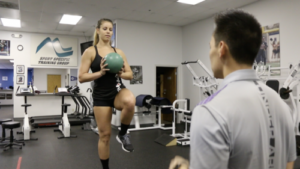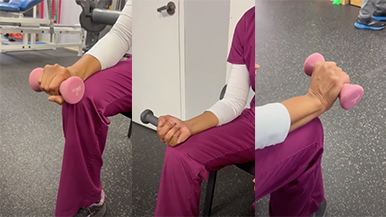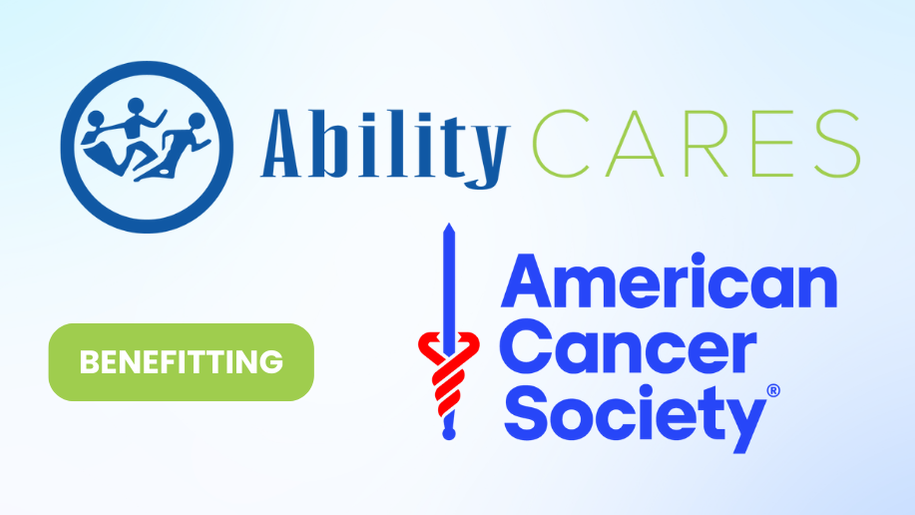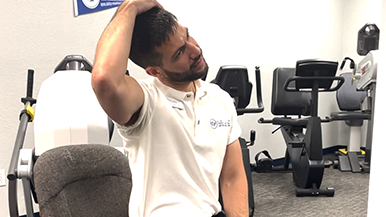Torn ACL Rehabilitation Helps Orlando Magic Dancer Perform Again
Lauren, a personal trainer, and Orlando Magic dancer suffered a torn anterior cruciate ligament (ACL) while doing box jumps during a workout. She required surgery to repair the torn ACL and decided on the sports medicine experts at Ability Rehabilitation to get her ready to work out and dance again.
“The biggest benefit of choosing Ability Rehab is the facilities,” says Lauren.
“The trainers are awesome, knowledgeable, and helped me get back to where I needed to be as quickly as possible. This place is just great.”
What is an ACL injury?
An ACL injury can happen when the knee locks while engaging in routine sporting motions like pivoting, cutting, sidestepping, or during an awkward landing. The damage can also occur as a result of a direct blow to the knee that forces it into a distressing position.
According to the American Orthopedic Society for Sports Medicine, about 150,000 ACL injuries occur annually in the U.S., costing Americans more than $500 million in related healthcare expenses.
Symptoms of an ACL injury may include:
- A loud “pop” sound
- Extreme pain
- Unable to continue the activity
- Swelling of the knee that progressively worsens
- Inability to put weight on the injured leg or discomfort when walking
Severe ACL tears usually require surgery to repair. The procedure involves removing the damaged ligament and replacing it with another ligament from the patient’s own body or a donor.
Recovery After ACL Surgery
ACL surgery is typically the first step on the road to full recovery. Following the procedure, it is critical for patients to embark on a rehabilitation plan under the guidance of a certified physical therapist. For athletes like Lauren, the rehab phase took on even greater significance.
“My first impressions coming here was that everything was very clean, the equipment looked awesome, and the facilities were well-equipped as opposed to other places that I’ve seen,” she says. “Everyone from the trainers to the front desk made me feel welcome as soon as I walked in the door.”
With tryouts for the Orlando Magic Dance Team just over the horizon, Lauren appreciated how her therapists took into consideration her unique goals and created a recovery timeline to ensure she was ready for the big day.
“I had very sport-specific goals, so I did have a timeline for my recovery,” Lauren says. “The trainers based my entire rehabilitation program on my timetable and made sure I got to exactly where I needed to be. They made me feel confident about my ability to get on track with my workouts and lifestyle.”
The general timeline for ACL repair recovery is about six months, and continuous physical therapy is a vital component to help restore range of motion, to strengthen the knee, and to improve flexibility.
Returning to activity too quickly can risk further injury. Lauren was impressed by how her therapists made sure her progress was safe and results-oriented.
“When I came in for a session they made me feel like I was working towards the goal but never past my limit to the point of worrying about re-injury,” she says. “It was always very productive, always for a reason, and very helpful.”
Within six to eight weeks of surgery physical therapists will introduce dynamic agility and more vigorous strengthening exercises. Patients usually start with slower, shorter strides and then gradually increase the speed and length of the drill when comfortable and feeling in control of their movement. Examples of dynamic practices include:
- Skipping forward, backward, and sideways
- Backpedaling
- Quick steps forward and stopping
- Fast stepping in place
Following her successful recovery, Lauren is grateful to the entire Ability Rehabilitation staff.
“Thanks to the trainers at Ability, I feel confident getting back on track with dancing, and I’ll be ready for auditions for the Magic again,” she says.
“To anyone else that has an injury, I would definitely, 100%, recommend Ability Rehab. All the trainers here are excellent, and they’ll get you to where you need to be in your recovery.”



